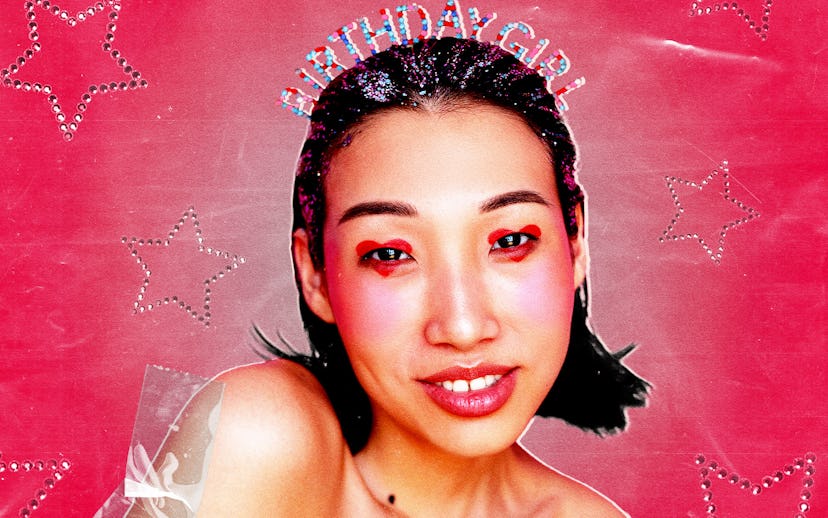
Beauty
“Birthday Makeup” Is Sparking A Battle of The Sexes On TikTok
Does your boyfriend really just “hate your birthday makeup” or is he reinforcing misogynistic gender roles?
If you’ve ever done a slightly more elaborate makeup routine on your birthday or New Years, you probably have thought nothing of it. It’s only natural to want to switch up your usual and go for a more dramatic look on special occasions, right? However, over the past few of months on TikTok, we’ve learned that many men have an oddly large amount to say on the topic. “Birthday makeup” (i.e. any makeup that’s worn to be noticed rather than look natural, like bright lipstick or glitter eyeshadow) has spurred all kinds of negative reactions online, from calling birthday makeup an “ick” to making videos complaining about “being seen in public with her” with it on. So, why is birthday makeup getting hate online and what does it say about the state of gender dynamics today?
Of course, this isn’t the first time that straight, cis men have had unwarranted opinions of the makeup choices of women and queer people on the internet. There’s a long-standing expectation for women who date men that “natural” makeup looks are preferred by their partners—which of course, doesn’t actually mean no makeup at all. Makeup, that draws attention is seen as “inauthentic”. It’s why some men joke about taking a girl swimming on the first date or comment on heavier makeup looks sayin, “one wipe and it’s all gone”. The reality is that makeup under the male gaze is finding a delicate balance of being put together enough to appease the patriarchy (cleanly shaven everywhere with no imperfections) but ensuring your efforts are never visible to the untrained male eye. God forbid you actually enjoy bold makeup and want it to be seen.
Charlotte Fox Weber, a psychotherapist and author of What We Want: A Journey Through Twelve of Our Deepest Desires, says the “no makeup-makeup” looks that men often idealize are a highly curated version of authenticity. “What we think is authentic might actually take a great deal of fine-tuning and the culmination of makeup application,” she says. Weber says the birthday makeup debate is an “extraordinary illustration of the mixed messages of cultural conditioning”. She explains, “The first instruction [under the patriarchy] is to put on makeup.” But then, “There’s the false encouragement that praise and approval might come on a women’s birthday—conditionally, based on the makeup—and then they push these women right into their trap.”
One TikTok creator Yuxin asked if men online were “collectively entering their sassy era” by “shitting on” birthday makeup. Unfortunately, the critique of women’s makeup has been around for centuries, as part of misogynistic purity culture. After all, Christianity has longtime made links between cosmetics and sin, and Victorian sex workers were referred to as “painted women”. By controlling women’s appearances, men are able to ensure and enforce that women never take up too much space or powerr in our patriarchal society, as they are too easy to critique and disregard. This dialogue only enforces the toxic gender roles that also stop men from feeling comfortable with wearing makeup or being vulnerable about their emotions, something this TikTok trend reveals many could benefit from.
“Men are the ones who are really wearing too much makeup, masking their real feelings and playing these clichéd characters,” says Weber. “I think men being more vocal is great, but dissing either side about appearances isn’t actually going to help establish a healthier gender dynamic. This is inadequacy that’s projected and detonated.” The birthday makeup discussion notably comes during a time when so-called “high value” male public speakers like Andrew Tate have been spewing trending misogynistic hate, bringing into question whether the rise of overt misogyny online is making space for people to feel too comfortable with accepting covert misogyny.
While men make videos about wiping off their girlfriend's birthday makeup or “ducking in the booth” at a restaurant because of the makeup their partner is wearing, many women have used the trending conversation as an opportunity to show their favorite birthday makeup looks, and stand up for their love of sparkly, colorful, and otherwise noticeable makeup. The biggest takeaway from the birthday makeup debate is that men still fear dramatic makeup looks because when women and queer people reclaim beauty standards for themselves, they hold power. In other words, wear what you want on your birthday — and every other day of the year.